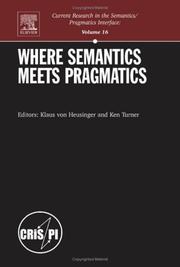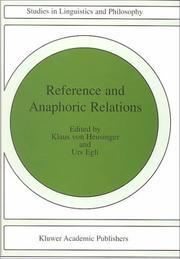| Listing 1 - 10 of 30 | << page >> |
Sort by
|
Digital
ISBN: 9783050073934 9783050031521 Year: 2015 Publisher: Berlin Akademie Verlag
Abstract | Keywords | Export | Availability | Bookmark
 Loading...
Loading...Choose an application
- Reference Manager
- EndNote
- RefWorks (Direct export to RefWorks)

ISBN: 9786611066512 1281066516 1402061978 1402061986 140206196X Year: 2008 Publisher: Dordrecht ; London : Springer,
Abstract | Keywords | Export | Availability | Bookmark
 Loading...
Loading...Choose an application
- Reference Manager
- EndNote
- RefWorks (Direct export to RefWorks)
This collection is an important contribution to the semantic and syntactic analysis of the expression of existence. The volume focuses on the three main linguistic constructions expressing existence: copular clauses, existential sentences, and (in)definiteness. The papers analyze the interaction between the basic notion of existence and pervasive phenomena of natural language, such as quantification and presupposition. The contributions represent state of the art research on theoretical and comparative issues related to the expression of existence, and make extensive reference to the semantic and syntactic facts of English and of various other languages. The richness of new data and the juxtaposition of different theoretical stances bring a number of new questions into focus.
Grammar, Comparative and general --- Semantics, Comparative. --- Existential constructions. --- Syntax. --- Comparative semantics --- Language and languages --- Syntax --- Existential constructions (Grammar) --- Semantics --- Linguistics. --- Comparative linguistics. --- Grammar. --- Romance languages. --- Semantics. --- Philosophy of Language. --- Comparative Linguistics. --- Romance Languages. --- Philosophy. --- Formal semantics --- Semasiology --- Semiology (Semantics) --- Comparative linguistics --- Information theory --- Lexicology --- Meaning (Psychology) --- Neo-Latin languages --- Italic languages and dialects --- Comparative philology --- Philology, Comparative --- Historical linguistics --- Linguistic science --- Science of language --- Sentences --- Verb phrase --- Grammar, Comparative and general. --- Linguistics --- Comparative grammar --- Grammar --- Grammar, Philosophical --- Grammar, Universal --- Philosophical grammar --- Philology --- Grammar, Comparative --- Language and languages—Philosophy. --- Grammar, Comparative and general Syntax

ISBN: 9780080449760 008044976X 9786610628407 1280628405 008046260X 9780080462608 Year: 2006 Publisher: Amsterdam Boston Elsevier
Abstract | Keywords | Export | Availability | Bookmark
 Loading...
Loading...Choose an application
- Reference Manager
- EndNote
- RefWorks (Direct export to RefWorks)
The Current Research in the Semantic / Pragmatics Interface series has carved out a new and vibrant area of research. This volume offers the reader a state-of-the-art record of new and established research in this area. Von Heusinger and Turner's careful selection of topics and contributors ensures that each chapter integrates semantic and pragmatic facts into a single theory, that each finds an adequate division of theoretical labour and that each attempts to design and corroborate an elegant account of meaning and use that would be compatible with other aspects of human behaviour. Importantly, each paper in the volume focuses on linguistic detail, not merely abstract discussions of a theoretical nature. Thus each paper makes extensive reference to the semantic and pragmatic facts of English and also other languages. This reference gives each of the proposed analyses a more adequate empirical edge and a sharper theoretical focus. This book is a must for all scholars and students interested in the new and vibrant discipline of semantics-pragmatics and to anyone who is fascinated by the prospect of working beyond the traditional disciplinary boundaries of linguistics and the philosophy of language. The chapters in this volume originate from a workshop at the Linguistic Society of America Summer Institute, held at Michigan State University.
Lexicology. Semantics --- Pragmatics --- Semantics (Philosophy) --- General semantics --- Language and languages --- Logic, Symbolic and mathematical --- Philosophy

ISBN: 0792360702 1402002912 9401139474 Year: 2000 Volume: 72 Publisher: Dordrect Boston Kluwer
Abstract | Keywords | Export | Availability | Bookmark
 Loading...
Loading...Choose an application
- Reference Manager
- EndNote
- RefWorks (Direct export to RefWorks)
This book is a collection of original research articles on the representation and in terpretation of indefinite and definite noun phrases, anaphoric pronouns, and closely related issues such as reference, scope and quantifier movement. A variety of frame works for the formal analysis of discourse semantics are represented, including dis course representation theory, file change semantics, dynamic Logic, E-type theories, and choice function approaches, which was one of the main issues the Konstanz project were concerned with. All of these frameworks are couched in the tradition of Montague Grammar, even though they extend the classical formalism in different directions. The developments emerged from the modern discussion of problems for the representation of cross-sentential anaphoric relations involving pronouns, and the interpretation of definite and indefinite noun phrases. After a decade of controversy, these approaches are merging together, enriching each other's formal mechanisms rather than expressing opposition. Thus, the articles in this volume concentrate on fundamental semantic questions, and also extend the current formalisms in order to capture more data. The roots of this book lie in the workshop "Reference and Anaphoric Relations", which was held at the University of Konstanz in June 1996. Five main issues were discussed: (i) the Stoic and scholastic treatment of reference and anaphora; (ii) quan tification and scope, (iii) anaphoric reference; (iv) the representation of indefinite NPs with choice functions; and (v) the relation between linguistic expressions, their rep resentations and their meanings.
Reference (Linguistics) --- Anaphora (Linguistics) --- Definiteness (Linguistics) --- Grammar, Comparative and general --- Référence (Linguistique) --- Anaphore --- Définis (Linguistique) --- Quantificateurs (Linguistique) --- Quantifiers --- Anafoor (Taalwetenschap) --- Anaphore (Linguistique) --- Verwijzing (Taalwetenschap) --- Quantifiers. --- Definiteness (Linguistics). --- Reference (Linguistics). --- Philosophy of language --- Anaphora (Linguistics). --- Grammar [Comparative and general ] --- Semantics. --- Linguistics. --- Language and languages—Philosophy. --- Artificial intelligence. --- Theoretical Linguistics. --- Philosophy of Language. --- Artificial Intelligence. --- AI (Artificial intelligence) --- Artificial thinking --- Electronic brains --- Intellectronics --- Intelligence, Artificial --- Intelligent machines --- Machine intelligence --- Thinking, Artificial --- Bionics --- Cognitive science --- Digital computer simulation --- Electronic data processing --- Logic machines --- Machine theory --- Self-organizing systems --- Simulation methods --- Fifth generation computers --- Neural computers --- Linguistic science --- Science of language --- Language and languages --- Formal semantics --- Semasiology --- Semiology (Semantics) --- Comparative linguistics --- Information theory --- Lexicology --- Meaning (Psychology)
Book
Abstract | Keywords | Export | Availability | Bookmark
 Loading...
Loading...Choose an application
- Reference Manager
- EndNote
- RefWorks (Direct export to RefWorks)
Book
ISBN: 1283398893 9786613398895 311174180X 3110226618 3110184702 9783110226614 9783110253375 9783110184709 9781283398893 6613398896 Year: 2011 Publisher: Berlin ; New York : De Gruyter Mouton,
Abstract | Keywords | Export | Availability | Bookmark
 Loading...
Loading...Choose an application
- Reference Manager
- EndNote
- RefWorks (Direct export to RefWorks)
Language and languages. --- Semantics. --- Semantics -- Handbooks, manuals, etc. --- Semantics --- Languages & Literatures --- Philology & Linguistics --- Formal semantics --- Semasiology --- Semiology (Semantics) --- Comparative linguistics --- Information theory --- Language and languages --- Lexicology --- Meaning (Psychology) --- Generative and Cognitive Linguistics. --- Linguistic Theories.
Book
ISBN: 3110255073 3110185237 1306968739 9783110255072 9783110185232 9783110253375 3110184702 9783110184709 3110253372 Year: 2011 Publisher: Berlin ; Boston : De Gruyter Mouton,
Abstract | Keywords | Export | Availability | Bookmark
 Loading...
Loading...Choose an application
- Reference Manager
- EndNote
- RefWorks (Direct export to RefWorks)
Grammar, Comparative and general -- Syntax. --- Pragmatics. --- Semantics. --- Semantics --- Languages & Literatures --- Philology & Linguistics --- Formal semantics --- Semasiology --- Semiology (Semantics) --- Comparative linguistics --- Information theory --- Language and languages --- Lexicology --- Meaning (Psychology) --- Semantics - Handbooks, manuals, etc --- Linguistic Theories.

ISBN: 9781402061974 9781402061981 9781402061967 Year: 2007 Volume: 84 Publisher: Dordrecht Springer
Abstract | Keywords | Export | Availability | Bookmark
 Loading...
Loading...Choose an application
- Reference Manager
- EndNote
- RefWorks (Direct export to RefWorks)
This collection is an important contribution to the semantic and syntactic analysis of the expression of existence. The volume focuses on the three main linguistic constructions expressing existence: copular clauses, existential sentences, and (in)definiteness. The papers analyze the interaction between the basic notion of existence and pervasive phenomena of natural language, such as quantification and presupposition. The contributions represent state of the art research on theoretical and comparative issues related to the expression of existence, and make extensive reference to the semantic and syntactic facts of English and of various other languages. The richness of new data and the juxtaposition of different theoretical stances bring a number of new questions into focus.
Grammar --- taalfilosofie --- Lexicology. Semantics --- syntaxis --- semantiek --- linguïstiek --- Grammar, Comparative and general --- Semantics, Comparative. --- Phrase existentielle --- Syntaxe --- Sémantique comparée --- Existential constructions --- Syntax. --- EPUB-LIV-FT LIVLANGU SPRINGER-B
Book
ISBN: 3110623137 311062639X 9783110626391 3110622963 Year: 2019 Publisher: Berlin ; Boston : De Gruyter Mouton,
Abstract | Keywords | Export | Availability | Bookmark
 Loading...
Loading...Choose an application
- Reference Manager
- EndNote
- RefWorks (Direct export to RefWorks)
Discover vital research on the lexical and cognitive meanings of words. In this exciting book from a team of world-class researchers, in-depth articles explain a wide range of topics, including thematic roles, sense relation, ambiguity and comparison. The authors focus on the cognitive and conceptual structure of words and their meaning extensions such as coercion, metaphors and metonymies. The book features highly cited material - available in paperback for the first time since its publication - and is an essential starting point for anyone interested in lexical semantics, especially where it meets other cognitive and conceptual research.
Semantics. --- Lexical grammar. --- Grammar, Comparative and general --- Adjective. --- Adjective --- Generative grammar --- Lexicology --- Formal semantics --- Semasiology --- Semiology (Semantics) --- Comparative linguistics --- Information theory --- Language and languages --- Meaning (Psychology) --- Nominals --- Generative and Cognitive Linguistics. --- Linguistic Theories. --- Semantics --- Lexical grammar --- Linguistics --- Philology
Book
ISBN: 9004252886 9789004252882 9789004251915 900425191X 9781306070997 1306070996 Year: 2013 Publisher: Leiden BRILL
Abstract | Keywords | Export | Availability | Bookmark
 Loading...
Loading...Choose an application
- Reference Manager
- EndNote
- RefWorks (Direct export to RefWorks)
This selection of research papers written by Hans Kamp presents the core of his scientific research on natural language semantics and its relation to logic, philosophy and linguistics. Arranged in six sections, the topics range from philosophical reflection on the foundational issues in the ancient Sorites Paradox with a formal account of its solution, to a detailed account of presuppositions in dynamic semantics. Ranking among the philosophers with great and lasting influence on formal semantics, Hans Kamp contributed early foundational research to core theoretical topics like temporal reference and vagueness, then pushed the boundaries of the discipline in new and productive directions. Showing the importance of non-truth-functional aspects of meaning, Discourse Representation Theory proved the value of a dynamic approach to interaction of text and context for our understanding of anaphora, word meaning and context-dependence. This collection shows very clearly how Kamp has forged ground-breaking connections among semantics, computation, and mental representation, challenging the once dominant Fregean anti-psychologism, while demonstrating that the best theoretical research can simultaneously yield important computational applications and novel cognitive insights. Barbara Partee, University of Massachussetts Amherst
Context (Linguistics) --- Discourse analysis. --- Meaning (Philosophy) --- Semantics. --- Formal semantics --- Semasiology --- Semiology (Semantics) --- Comparative linguistics --- Information theory --- Language and languages --- Lexicology --- Meaning (Psychology) --- Philosophy --- Semantics (Philosophy) --- Discourse grammar --- Text grammar --- Semantics --- Semiotics --- Grammar, Comparative and general --- Situation (Linguistics) --- Linguistics --- Context --- Discourse analysis
| Listing 1 - 10 of 30 | << page >> |
Sort by
|

 Search
Search Feedback
Feedback About UniCat
About UniCat  Help
Help News
News